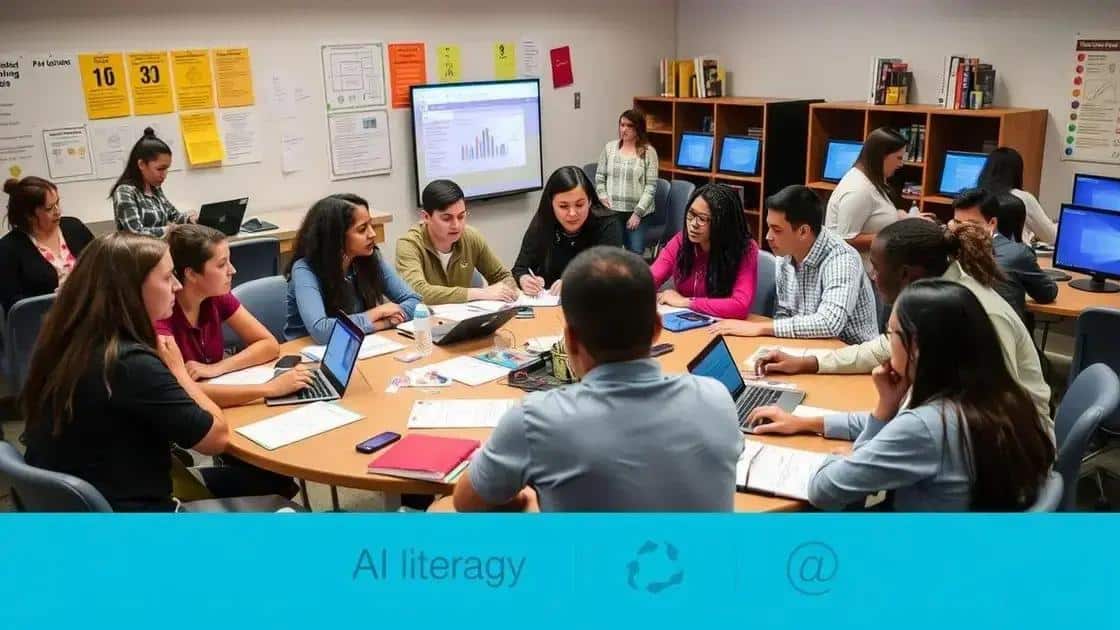Insights on ai literacy campaigns: a path to empowerment

AI literacy campaigns focus on empowering individuals through tailored education, integrating technologies like VR and AR, and promoting ethical conversations to prepare learners for a tech-driven world.
Insights on ai literacy campaigns reveal a growing movement aimed at equipping people with the knowledge to engage with technology confidently. Have you ever wondered how understanding ai can impact your daily life and decisions? Let’s dive in.
Understanding the importance of ai literacy
Understanding the importance of ai literacy is crucial in today’s technology-driven world. With the rise of artificial intelligence, knowing how to interact with these systems can empower individuals in various fields.
To grasp the significance of ai literacy, we need to explore its benefits. First, individuals who are literate in AI can make informed decisions. They understand how AI algorithms work, which tools to use, and what ethical considerations to keep in mind.
Benefits of ai literacy
Here are some key advantages:
- Enhanced productivity through AI tools
- Better problem-solving capabilities
- Informed discussions about AI policies
- Improved job prospects in a tech-driven market
Moreover, ai literacy fosters innovation. When people understand AI’s capabilities, they are better equipped to leverage these technologies for their own ideas. This understanding can lead to new applications in education, healthcare, and more.
Real-world examples
Take, for example, the use of AI in healthcare. Medical professionals who possess ai literacy can utilize technologies for improved patient outcomes. By understanding AI-driven diagnostics, they can make quicker and more accurate decisions. This application underscores the necessity of being literate in AI.
In the corporate world, companies that focus on training their employees in AI skills often enjoy a competitive edge. As the workforce becomes more familiar with AI technologies, overall efficiency increases. Understanding these concepts is no longer optional; it’s essential.
Additionally, strong ai literacy helps mitigate fears associated with AI. By educating the public about how AI operates, we can address misinformation and build public trust in these technologies. Being knowledgeable allows individuals to advocate for responsible AI usage in their communities.
Key components of successful ai literacy campaigns

Key components of successful ai literacy campaigns include various elements that ensure effective learning and engagement. To make these campaigns effective, it is essential to understand the target audience. Knowing their background, age group, and current understanding of AI can significantly shape the campaign’s approach.
Additionally, creating engaging content is crucial. This includes interactive workshops, online tutorials, and hands-on activities. When learners actively participate, they retain information better. It’s not just about delivering information; it’s about making it relatable.
Best Practices for ai Literacy Campaigns
Effective campaigns often follow best practices:
- Use simple, clear language to explain concepts.
- Incorporate real-world examples and case studies.
- Encourage questions to foster a learning environment.
- Utilize various formats, such as videos and infographics.
Another key aspect is collaboration. Partnering with educational institutions, tech companies, and community organizations can enhance the reach and effectiveness of campaigns. These partnerships can provide valuable resources and expertise.
Continuous feedback is also important. Gathering input from participants can help organizations refine their approaches. This ensures the content remains relevant and engaging for learners. After all, understanding is not a one-time event; it’s an ongoing process.
Measuring Success
Finally, measuring the success of ai literacy campaigns is vital. This can be done through surveys, assessments, and tracking participation rates. By analyzing this data, campaign leaders can identify what works and where improvements are needed.
The goal is to create a cycle of learning that adapts to the needs of the audience. When campaigns are tailored to their learners, they can achieve remarkable outcomes in ai literacy.
Case studies: Ai literacy initiatives in action
Case studies of ai literacy initiatives offer valuable insights into their impact and effectiveness. These real-world examples showcase how organizations and communities have successfully implemented programs to improve AI understanding.
For instance, a school district in California launched a program focusing on middle school students. They incorporated interactive modules that allow students to explore AI concepts through games and projects. This hands-on approach not only engages students but also helps them grasp complex topics.
Successful Initiatives
Some notable initiatives include:
- AI4All: A nonprofit that focuses on increasing diversity in AI by providing educational opportunities to underrepresented groups.
- Data Science for All: A program aiming to teach AI principles to high school students, preparing them for careers in technology.
- AI + Ethics: A campaign that combines AI education with discussions on ethical implications, promoting responsible technology use.
These programs demonstrate the importance of making AI education accessible. They cater to various audiences, ensuring that everyone can participate and benefit from learning about artificial intelligence. Accessibility is key, allowing diverse groups to engage with technology.
Another inspiring case is a community college in Texas that partnered with local businesses to deliver workshops on AI tools. By involving industry professionals, students gain practical skills that make them job-ready. This approach not only enhances learning but also helps bridge the gap between education and the workforce.
The successes of these ai literacy initiatives highlight the need for continuous improvement and adaptation. Organizations can learn from one another to create programs that resonate with their specific audiences. Sharing best practices paves the way for enhanced AI literacy across different sectors.
Future trends in ai literacy and education

Future trends in ai literacy and education are shaping the way we understand and interact with technology. As artificial intelligence evolves, so does the need for effective educational strategies that prepare individuals for a tech-driven world. This evolving landscape requires a continuous focus on new learning methods.
One significant trend is the rise of personalized learning experiences. With AI, educational platforms can tailor content to meet each learner’s needs. This approach helps students progress at their own pace, enhancing engagement and retention. Imagine a classroom where each student learns AI concepts based on their interests and understanding level.
Emerging Technologies in AI Education
Innovations such as virtual reality (VR) and augmented reality (AR) are becoming more integrated into ai literacy education. These tools allow students to immerse themselves in simulations that demonstrate AI applications in real life. By experiencing AI in action, learners gain a deeper understanding of its impact.
- VR can create realistic scenarios for training.
- AR can overlay information on real-world objects to illustrate AI principles.
- These technologies promote active learning and critical thinking.
Another trend is the collaboration between tech companies and educational institutions. Many businesses are investing in education by providing resources and expertise. This partnership ensures that programs remain relevant to the skills needed in the job market. It also helps students discover career opportunities in AI fields earlier on.
Furthermore, there is an increasing emphasis on ethical AI. As understanding grows, educators are integrating discussions about ethics and responsibility into the learning process. Students are encouraged to think critically about how AI impacts society and to consider their role in promoting ethical practices.
Lastly, as technology continues to evolve, the demand for continuous learning becomes apparent. Lifelong learning in ai literacy is crucial. Professionals must adapt to new tools and techniques. Online courses and workshops will likely become more prevalent, allowing individuals to stay updated and relevant in their fields.
FAQ – Frequently Asked Questions about AI Literacy and Education
How can AI literacy benefit individuals in their careers?
AI literacy enables individuals to understand and leverage AI technologies, making them more competitive in the job market.
What role do partnerships play in AI education?
Partnerships between educational institutions and tech companies enhance learning by providing real-world applications and resources.
Why is ethical discussion important in AI literacy?
Ethical discussions help students consider the societal impacts of AI, promoting responsible use and development of technology.
What innovations are shaping the future of AI education?
Innovations such as virtual reality, augmented reality, and personalized learning platforms are transforming how AI concepts are taught.





